#obviously these are my opinions
Text
One of my recent Jason posts has people talking about how valid a writers portrayal of a character is if that writer hates that character which is an interesting conversation specifically when it comes to Jason bc in case you didn't know a lot of writers do not like Jason but also a good few of the writers who hate Jason have also written some of his better stories
Basically what I'm saying is someone should make an alignment chart with one line being how much a writer loves or hates jason and the other line being how good the writer is at writing Jason
#dc#batman#dc comics#jason todd#red hood#also you know#this would cause drama#but yeah bc obviously you have your morrisons who hate jason and right Jason like shit#on the opposite end you have winnick who loves jason and writes him well#then lobdell who loves jason and yet still commits character assassination any chance he gets#and then Stirling who was trying really hard to get people to hate jason but still made him enduring#but thats just my opinion
565 notes
·
View notes
Text
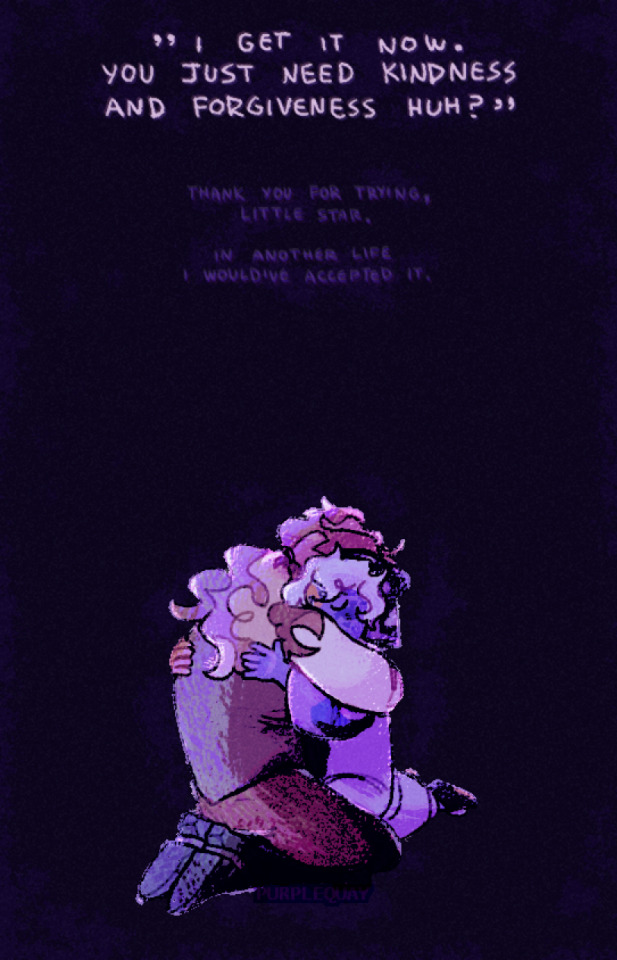
wren's lullaby - dandelion hands // personal slash self indulgent piece
#💉heretic's art#vent art#the owl house#toh emperor belos#toh collector#toh s3 spoilers#<- technically ?#idk who needs to hear this but this is very obviously not supposed to be connected to the canon show or my opinions abt the finale#this is just for ME and caters to ME only <3
1K notes
·
View notes
Text
Ppl going "waaahh unpopular opinion but Alice is kind of annoying and obnoxious and I don't think I'd like be her friend irl" is so funny to me bc like.
God forbid a cast of characters be multifaceted and have actual flaws and unpleasant aspects other than "grr angsty hero" and "whoops i'm so clumsy". Sometimes character dynamics and arcs need to be prioritized above "who would i personally be niceys with irl"
2. bro just WAIT until you hear about season 1 jon lol
#the magnus protocol#tmagp#season 1 jon was obnoxious and sometimes a straight up ASSHOLE and you were supposed to find him kinda grating!!!#yes alice IS a bit annoying and too much sometimes (esp in the first episodes) and i love that <3#like. its p obvious that she uses the over the top-thing as a shield (to push ppl away/as a defense mechanism/to avoid being vulnerable)#we see her drop the act sometimes w ppl like teddy and sam who she actually feels comfortable around (and who know and understand her)#but like. she's stuck in a job she hates and is kind of afraid of (she KNOWS smth abt the horrors and is keeping her head down to survive)#(shes obviously afraid of sam going to far bc she KNOWS its dangerous)#so yes her act gets too much sometimes and yes sometimes she crosses the line into straight up mean (esp against gwen)#(but their dynamic is a whole other can of worms)#but like. i'm pretty sure its supposed to be seen that way. the audience isnt supposed to just find her kooky funny#the facade is supposed to be dismantled by the viewer etc etc#kind of like SEASON 1 JON the obnoxious bastard!!!!!!!#like. if you ever think alice is too mean towards gwen pls listen to s1 jon again and how he speaks abt martin??#from a position as his boss no less? ngl i wanted to throttle him sometimes#you kinda forget abt it in the later seasons and if you only engage w fandom content. but like. go back and listen to the shit#he actually says. jesus christ man. i remember kinda hating him in the beginning#and to be clear i love jon! i think hes a great character!#and like. its almost as if his early season personality and facade was an important setup for his character development#and relationships with the other characters???#but anyway 'alice is kind of annoying' is not an unpopular opinion its literally the FUCKING POINT#and both her and jon are my sweet baby angels <3#alice dyer#jon sims#(and obviouslyyy you're still allowed to dislike a character ppl can have their own opinions etc etc etc. i just personally find it funny)
184 notes
·
View notes
Text
CLASSES - a comprehensive guide
The first thing that needs to be said is that there is no such thing as a "bad" class. All of them have the potential to be a great detriment OR great boon to the rest of the team, depending on how far along the journey of self-actualization a party member is. Some may have steeper challenges, but this corresponds with greater rewards.
The second thing that needs to be said is that all players are part of a team, and all personal journeys and playstyles are interlinked. No class is truly "solo." Even the smallest viable session is still two people, and even the most suitable classes for solo play are stronger when they're in a party.
The last thing that needs to be said is that the game wants you to succeed. The game, inherently, wants every player to reach godhood, wants every player to self-actualize, wants every player to win. It respects free will and free choice, so it will allow for failures (and, indeed, doomed timelines are vital to the alpha one existing), but Skaia is ultimately optimistic, and tries at every turn to ensure that a golden ending is possible.
Because, after all, SBURB/SGRUB - and Homestuck itself - are about children growing up, maturing, and learning compassion for each other. About fixing their flaws and rejecting the negative aspects of the society they came from. It's about how it is our duty, our responsibility, to become kind, mature people who care about one another, because we will one day be responsible for creating a new society.
And so, without further ado:
ACTIVE (-) Classes and PASSIVE (+) Classes are described with the dichotomy of "powers working for the self" vs. "powers working for others," but I believe this to be an oversimplification of what the active and passive split is. Both active AND passive classes benefit from being in a party; however, an active class will gain fewer party benefits in exchange for being more suited for solo play, while a passive class will be less suited for solo play, but confer much greater benefits to party play.
This is reflected in their personal quests: while active classes and passive classes will both require intervention, empathy, and guidance from their teammates, the struggle of an active class is usually one of grappling with internal flaws, and the struggle of a passive class is one of grappling with interpersonal or societal relations. In other words, the personal quest of an active player will usually involve getting therapized, while the personal quest of a passive player will usually involve addressing a systemic societal issue. Often, both will be required, but whether a class is active or passive will indicate an area of focus.
KNIGHT - / MAID +
PARTY MANAGEMENT
one who wields [aspect] or leads with [aspect] / one who distributes [aspect] or manages with [aspect]
KNIGHTS (-) are a very flexible and versatile class; "wielding" their aspect does not necessarily mean they are skilled at DPS. It actually indicates the way a knight interacts with their aspect, a very straightforward relationship of tradesperson and tool, or soldier and weapon. Similarly, while a knight does not always take up the "leader" position in the party, they will be the "spearhead," a point behind which the other players rally, a beating heart keeping the party together.
This straightforward relationship between a knight and their aspect leads to knights finding little difficulty mastering their aspect once they've begun. Many knights are, in fact, instinctively drawn toward utilizing their aspect, in the same way that they are naturally drawn toward roles of importance or heroism.
Knights often struggle with their perceived place in society, as well as with their innate sense of self and self-worth, seeing themselves as outcasts, resenting the responsibility placed on their shoulders, and fearing vulnerability. Unaddressed, these issues will lead to knights who actively become a detriment to party success. For example, they can dismiss valid concerns, shirk their duties, and in the worst case scenario, actively lead the party down the wrong path, invoking their natural ability to lead for ill.
Therefore, a knight's journey is one of accepting themselves and accepting their duty to better the world. It is about coming to terms with their own insecurities and learning to rely on others. It is about learning to take responsibility, and accepting the banner of a just and glorious cause.
A fully realized knight will be the center of every charge, the guiding star behind which the other players rally. They can provide clarity and guidance to those still on their journeys, and peace and comfort to those who are struggling or in pain. Where the knight goes, the party will follow, as a unified and united front.
MAIDS (+), meanwhile, tend to be on the backlines. If the knight is the forward march, then the maid is the supply line, an incredibly vital role whose absence is disastrous, even if its presence is nearly invisible. Maids have a nearly infinite well of their aspect to distribute, and are uniquely talented at managerial duties - keeping players on task, patching up the holes in a plan, sourcing and supplying resources, so on and so forth.
This is not to say that maids are relegated to support roles - a maid is usually capable of holding their own in combat just fine, especially if they've been endowed with a more combat-suited aspect. Both knights and maids are extremely versatile. That being said, maids truly shine when they're able to take on these backline roles, and many maids are more noticeable by the devastating effects of their absence rather than the invisible touch of their presence.
However, they are the class that most often starts in subservient conditions - low status, strict duties enforced upon them, so on - and their personal journey is a constant struggle against the control of others. Maids whose parties fail to grapple with and undo these shackling forces will find their maids succumbing to the influence or control of malicious entities; in the worst-case scenario, a maid can become an actively hostile enemy or saboteur, invisibly pulling the party's strings and setting them up for failure.
Therefore, a maid's journey is about rejecting societal oppression and throwing off the chains that bind them. A successful maid rises to become the head of the household - nothing occurs within the game that does not first pass the maid's inspection, and their touch ensures that there is a place for everything, and everything is in its place.
A free maid, who belongs to themselves, incomparably increases a party's efficiency. Every communication line is clear, every distribution route is clean, every mystery is solvable, and every plan is airtight. A maid guarantees that nothing can ever go too wrong.
PAGE - / HEIR +
TEAM BONDING
one who must earn [aspect] or inherits the mantle of [aspect] / one who is beloved by [aspect] or awakens to [aspect]
PAGES (-) start the game with the fewest benefits from their aspects, but the greatest potential for growth. Theirs is a constant battle with the self; they are often cowardly and naive. They possess sensitive souls, and while it is incredibly easy to hurt a page, it's much more difficult to build them up. Because of the difficulty of raising this class, it's practically defined by its journey - a constant struggle against the self - rather than its destination, and the powers the class confers.
Pages, like heirs, are classes of inheritance. A page is promoted by trials and tribulations and comes to inherit a greater power than they begin with; in the same way, the class will one day come to embody its aspect, although the road will always be turbulent and long. Moreover, it is a journey without end; pages, being as sensitive as they are, are the most prone to backwards progress, even after reaching their peak.
They prone to staying weak throughout the entire game, never self-actualizing past being the party joke. They attract the obsession and ridicule of stronger-willed players, and their mistreatment can become extremely divisive. A page can easily become a party's albatross, the epicenter of massive interpersonal conflicts, which can tank an entire session.
Therefore, a page's journey is one of the most difficult of all - that of teaching others how to care about other people. Pages rely on great patience, kindness, and understanding. Their sensitive souls must be carefully nurtured and propagated with love and attention. In the same way that a page can tear a team apart, they can bring a team together, all in the name of compassion and empathy. A fully-realized page is the symbol of a party that has linked hands with one another.
Self-actualized pages, as a result of the difficulty inherent to the class, are incredibly powerful and versatile when fully realized. Inheriting the mantle of their aspect, they become pure embodiments of their aspect, capable of achieving impossible feats of raw, unfiltered power, and inspiring all those who gaze upon them.
HEIRS (+) begin the game very strong, but have a difficult time becoming stronger. This is because their usage of their aspect is very instinctual to them, even at times being entirely beyond their control, hence, "beloved by" in the class description. However, because of how naturally their aspect comes to them, it makes taking further command of their powers difficult.
An heir "awakens to" their aspect because their natural, intuitive control often renders them too comfortable to grasp the greater implications of their class. As an inheritance class, heirs can come to embody their aspect, transforming entirely into it. Their challenge lies in breaking out of their comfortable shell and learning how to utilize their powers in more active, intentional ways.
This is reflected in their personal quests. They are often set to inherit great privilege or wealth prior to entering the game, and are thus naive to the realities of the suffering and pain of others. Without a supportive party willing to challenge their views, heirs can perpetuate that pain by submitting to their place in the world, becoming a divisive force within the party, or, in the worst case, losing themselves to their inheritance, and submitting so wholly to their aspect that they become lost to the rest of the team.
Thus, an heir's journey is to question the stratification of the society they belong to, so that they can recognize and address its flaws. They must learn to interrogate their inheritance, separate it from themselves, and reconcile with it. Theirs is an arc of examination and understanding, descending from their position of privilege and peace to learn about the suffering of others, and deciding that they wish to do something about it.
With full command over their aspect, and a clear vision for how it ought to be distributed, the party gains a new and powerful ally - the aspect itself, which will come to embrace the entire party as family. A fully-realized heir connects the privileged and underprivileged, spreading their inheritance to all.
MAGE - / SEER +
GUIDANCE
one who invokes [aspect] or is drawn to [aspect] / one who comprehends [aspect] or is guided by [aspect]
MAGES (-) are a class of prophets, although saying they "see the future" is misleading. Rather, mages "invoke" the future, collapsing causality to align to their desires. Most mages remain unaware that they are doing so until well into their journey. While all players weigh on the scale of causality, affecting both past and future events, and which sequence of events is the "alpha" sequence, mages have the most direct effect.
Because of this ability to invoke future events, mages possess powerful buffing/debuffing abilities. Furthermore, as one of the two knowledge classes, a mage usually has a very deep understanding of their aspect, and an intuitive knowledge of how the flow of time and causality function. They are "drawn to" their aspects in this way, instinctively searching out points where their influence can affect the flow of events.
However, with great power comes great cost; the mage class is usually assigned to those who are stricken by tragedies and prone to negativity and self-loathing. Mages often begin the game as a detriment to the party, "prophesying" future events that leave the party - including themselves - at a disadvantage. In the worst case scenario, a mage can invoke certain doom for their party or themselves.
Therefore, it is vital that a mage address their tragedies and be given a chance to heal and grow. The ones most struck by tragedy, theirs is a journey of reclaiming lost joy and rediscovering lost hope. However, the transformation is powerful once completed - as the one who suffers tragedy and loss most intimately, a mage can also come to be one of the most empathetic and compassionate members of the team.
If a mage is uplifted, and capable of believing in a kinder and gentler world, then their ability to invoke the future - and the aspects of their aspect that they are drawn to - become kinder, as well. Pain and suffering still have their place, but the ending will be a happy one. With a fully empowered mage, the future will always be better than what came before.
SEERS (+) see multiple branching paths. A mage determines where a road will be built, but a seer tells you where a road CAN be built. They are also often gifted with knowledge of the game and its mechanics, and are especially uniquely gifted with understanding of their own abilities. In this way, they "comprehend" their aspect.
Seers themselves are not particularly gifted in combat through their classpect alone; however, in exchange, they often play a vital role in steering the party. They are the game's built-in guides, with an intuitive knowledge of the game's victory conditions, as well as an instinctive desire to lead others along their paths. Seers are, therefore, one of the most important classes in the game, when one is present.
However, the ability to see is a burden as well as a gift. Seers find themselves paralyzed by choice, and often doubt their own abilities to choose "correctly." They are prone to becoming mired in what-ifs, and struggle with political or ethical debates with no clear answers. In the worst-case scenario, a seer may feel so cursed by their sight that they self-destruct, and deliberately choose poor or incomprehensible answers, in an attempt to free themselves of their sight.
Thus, a seer's quest is, ironically, to see the world beyond the purview of their aspect. They must come to have a more comprehensive understanding of the world they live in, and what purpose they are trying to achieve, so that they can feel confident in the choices they make. A seer is often blind - their journey, therefore, is that of regaining their vision, by connecting with the world outside their inner sight.
A seer with a clear vision for the future will always know exactly which path to choose. A party with such a seer in it will never be stuck and never be lost. If there exists a path to self-actualization, the seer will know it. And if there exists a path to a breathless and perfect victory, a fully-realized seer will light the way.
THIEF - / ROGUE +
UTILITY
one who steals [aspect] from others or steals with [aspect] / one who steals [aspect] for others or steals from [aspect]
THIEVES (-) are a very difficult class to play. They start out with almost no passive abilities regarding their aspect, and their ability to actively use their aspect is contingent on their ability to first "steal" it from someone else. Thus, they are always playing a game of resource management, and there is always a chance for them to be left helpless after a heist gone wrong.
However, their gimmicky nature allows them to overtake other classes even in that class's specialty, if they can set up the exact right circumstances and manage their resources well. This makes them incredibly versatile, especially when a thief is working together with a party, and thus able to count their party among their potential resources. It takes great cunning to play the thief class well.
However, this also makes the thief a potentially dangerous element to the rest of the party. Thieves are often egotistical and self-serving, willing to see enemies and allies alike as resources and tools. Unaddressed, their reckless, selfish natures will earn their teammates' distrust and enmity. In the worst case scenario, a thief running rampant can severely harm the party, or earn so much ire that the party turns against them.
Thus, their journey is that of realizing that their selfishness and ego are flaws - the classic parable of "money doesn't bring happiness." Beneath their uncaring surface lurks genuine emotional distress; a thief must come to realize that their greed and selfishness is an active detriment not only to the people around them, but their own selves. Only then can they heal from their injured souls.
A thief that has undertaken this journey is one who has realized that they are stronger when they are working with others. Their versatility, creativity, and cunning are incredible assets once harnessed toward the will of the party. No situation will ever be inescapable, no safe uncrackable, and no problem unsolvable - not if the thief has anything to say about it.
ROGUES (+) are similarly difficult to play. Unlike the thieves, rogues do see passive benefits from their aspects. However, their active abilities are much less straightforward, and rogues often struggle with understanding them. A rogue's role is to redistribute wealth - thus, "stealing for the sake of others."
A rogue, being able to steal directly from their aspect, truly shines when given enough time to prepare. If a thief must fly by the seat of their pants, then a rogue is a heist planner - they have an infinite box of tools to pull from, if only they know what tools they'll need for the job. This makes them incomparably versatile, even if not necessarily in the heat of combat.
Rogues take on the mantle of challenging the status quo. They usually begin the game already in opposition to their society, seeking out better alternatives and considering unorthodox options. However, not every party is ready for a rogue's radical ideology, and not every rogue has considered the full consequences of their belief in change; in the worst case scenario, the rogue can become outcasted and disregarded, or cause an upheaval that proves disastrous, rioting for the sake of rioting.
It often requires the help of others for a rogue to understand how to use their powers. In the same way, it requires the party's honest communication and exchange of ideas to help a rogue grasp exactly what form their rebellion ought to take. A rogue knows instinctively that something must change; their journey is learning how they ought to go about it.
Once they do, a rogue - given enough time to prepare and plan - is the ultimate utility player, having the right tool for every possible situation. Their abilities are only magnified in a party setting, as their teammates become variables that unlock new possibilities. A party with a fully-prepped rogue always has a perfect plan, a way to solve any problem that they might face.
WITCH - / SYLPH +
AREA CONTROL
one who manipulates [aspect] or achieves dominion through [aspect] / one who nurtures [aspect] or creates a land of [aspect]
WITCHES (-) carry with them the winds of change. A witch manipulates, changing properties of their aspect and their aspect's effect on others, creating a "territory" over which they rule. They see few passive benefits of their aspects, in exchange for their active abilities being so all-encompassing and overwhelming.
Once their territory has been established, witches make the rules. Their changes can be permanent, temporary, massive, and miniscule. However, a witch "achieves dominion" with their aspect - this means that they must first struggle to create this domain, and it's difficult for their abilities to manifest until they do, often leaving younger witches weak and vulnerable.
Witches have strong feelings for how things should and should not be, but not necessarily grounded ideas for how to implement them, often due to some "outsider" status in society. Unfocused witches become dangerous for the party, as they are easily manipulated; in the worst-case scenario, they can fall in with malicious forces, who can sway a witch's turbulent heart and utilize them as a force for negative change, rather than good.
Thus, a witch's journey is that of interrogating right and wrong. A witch must struggle with morality and ethics, and come to clarify their own beliefs; only then can they know what sort of domain they wish to establish, and what sort of rules they wish to enforce. Once they know their own hearts, they can shake off the insidious whispers of malicious external influence.
As if a reward for their struggles for autonomy and independence, the witch is the one whose will is most imposed on the world that comes after them. Just as an evil witch putrefies the world around them, a fully-realized witch who has decided to use their influence for good can create a near-utopia.
SYLPHS (+) call to mind the images of fey folk who sprout plants where they walk. That is how a sylph "creates a land" of their aspect - merely by existing, the world around them becomes suffused by it. A sylph's mere presence nurtures, grows, and heals their aspect; unlike witches, who manipulate what is already there, sylphs can create something from nothing.
The establishment of their domain comes naturally to them. Those caught within it are on the receiving end of their aspect, whether they want to be or not. In exchange for such powerful passive abilities, a sylph's active abilities are weaker, and usually unsuited for solo combat, generally being of healing, buffing, or debuffing nature.
A sylph is prone to selfishness - to luxuriating within their own land, their own aspect, their own mind. They often have difficulty connecting with others and understanding why their own personal world may not be to the liking of the world outside of themselves. Often, they are aloof. An unrealized sylph can cause great harm to the world around them, their domain choking out and smothering their party; in the worst case, they can mire their party within it, leaving their party unable to proceed.
Thus, it often requires the outside world to breach their safe haven in order for a sylph to grow. They must be made uncomfortable, and then made to accept that uncomfortable things are also important - maybe even more important than comfort, at times. Growth often requires pruning; a sylph's journey is to come to understand that good intentions may lead to harm, and, vice versa, that harm can often lead to true growth.
Sylphs can provide the greatest compassion and emotional comfort within a party, encouraging - if not enabling - their teammates' growth in their personal journeys. Once a sylph understands when it is appropriate to encourage, and when it is appropriate to pull back, there is no refuge safer for the party than the sylph's domain.
PRINCE - / BARD +
OBSTACLE REMOVAL
one who destroys [aspect] or destroys with [aspect] / one who allows the destruction of [aspect] or allows destruction through [aspect]
PRINCES (-) possess the ability to annihilate, a destructive class not limited to physical or tangible objects. Princes also enjoy auxiliary benefits as befits their royal titles - many princes start the game with great talents, great status and wealth, or both. They are also endowed with royal presence; their very existence provokes strong emotions from those around them, for good or for ill.
One of the more straightforward classes in the game, a prince's ability to destroy most commonly manifests as DPS. However, their abilities encompass a greater scope than mere damage - the prince's ability to annihilate figurative or metaphysical concepts makes them capable of directly removing any obstacles that stand in their way. As if hungry to consume their aspect, they are naturally drawn towards where it congregates.
However, with great power comes great responsibility: princes are often the most psychologically maligned within the party, and their destructive talents can very easily become self-destructive instead. Usually the result of societal pressure, trauma, and suffering, a prince is prone to embodying the lack of their aspect, rather than its presence. In the worst-case scenario, a prince spreads this misfortune to the rest of their party, destroying the presence of their aspect from their session altogether, often taking themselves along with it.
A prince must be shown compassion. Though they are often viscerally unpleasant to engage with, turning a blind eye to foolishness, loneliness, and suffering - which a prince embodies - is one of the worst things that a party can do. Though the effort at times seems undeserved, to heal a prince requires a staunch belief that there is good to be gained if we are kind to each other. This kindness will be returned; once you are counted among a prince's "people," they will do anything to keep harm from befalling you.
A prince, once shown this grace, is incomparably powerful. To destroy their aspect or with their aspect is the ability to destroy nearly anything, including concepts such as despair, death, and doom. As if proclaiming a royal decree, a fully-realized prince can banish misfortune and ill tidings altogether, leaving nothing standing in the party's way.
BARDS (+) are a wildcard of a class, often responsible for a party's improbable victory, abject defeat, or both. Their abilities are not very well-understood, even by the bard themselves, and they often utilize both passive and active abilities intuitively, unaware that they are doing so. The morale of the party is deeply tied to the bard's own, and it's unclear which side is cause and which is effect.
The ability to allow the destruction of their aspect, or invite it through their aspect, is actually something of a debuff rather than DPS - the bard's ability is to break unbreakable shields, tear down unclimbable walls, and nullify unstoppable forces. Rather than dealing damage themselves, they allow for damage to be dealt that would otherwise have no effect - in other words, by nature, they make the impossible possible. This is the true source of their ability to evoke "miraculous" situations.
Bards are inextricably tied to society - after all, their tales only hold as much value as their relevance to the audience. This means those with the bard class are invariably molded by the worst aspects of the society they come from. They serve as living embodiments of the most unpleasant aspects of society, and living reminders that leaving these elements to fester only means they will multiply in severity. If these beliefs are allowed to go unexamined, bards will always steer a party towards ruin.
Therefore, a party must engage with the bard earnestly, compassionately, and openly, and help them see the errors of the past. A bard must be led, with gentle guidance and genuine openness, to discard their harmful beliefs, and sing a new, more beautiful tune.
A bard that has been brought back into the fold is a worker of miracles. When every other possible option has been exhausted - the knight and maid in disarray, the page and heir unable to keep the party together, the mage and seer blinded, the thief and rogue out of action, the witch and sylph with their territory lost, the prince no longer able to function - this is where a bard will step in, transmuting abject defeat into a perfect and breathless victory.
#homestuck#classpect#classpects#just my own opinions obviously#feel free to disagree#this is also more meant to examine the actual text of homestuck or serve as a reference for fanworks#i dont actually vibe that much with classpecting actual real people#because unlike fictional characters we contain multitudes#still i cant STOP you if thats what you want to do hahahah
392 notes
·
View notes
Text
tbh all jiang cheng ships are hypothetically good to me because jiang cheng is just so not in a good place for dating or marriage. no one should wife him up which is why anyone wifing him up has great comedy potential. it is a situation you're putting him in where he's forced to cope with intimacy and the possibility of betrayal or rejection. he's going be thinking about his parents' marriage except for the times he's going to be thinking about his sister and his redacted. and also there is the potential for someone to die horribly and leave him alone with a baby. again.
#tagging this with one of my more controversial opinions which is that while we the readers are basically told that the rumours are false#and wei wuxian believes the rumours are false#from jiang cheng's perspective wei wuxian is schrödinger's brother in like three different ways#one of them literal! does he trust that his dad didn't cheat on his mom: no. obviously#does he trust that wei wuxian's mom wouldn't cheat on her husband? he doesn't know her and he doesn't have wwx's attachment to the idea of#her#so anyway legally no biologically maybe emotionally REDACTED#ps yanli said so in public once REDACTED REDACTED REDACTED#maybe he'll think about wc and wzl a little#because you know. snuggles on the lotus pier throne#maybe had something going on with his mom#came into his house and did things to his body that can't be undone#yanli... like the yanli issues are so depressing but if he somehow married and it was somehow not a disaster#always the possibility of being torn from him by death
228 notes
·
View notes
Text
I'm begging y'all to be sane. I get that it's exciting a show has got to 100 episodes and the show should celebrate that but also I need to be very clear (as someone who works in TV and has done for a fair amount of time), sometimes a big "milestone" episode are just a regular episode from a story perspective. Stop building it up to be something it probably won't be because the vitriol and ire that some of you have shown to the cast is frankly repugnant and you should be fucking ashamed of yourselves.
#911 abc#911 fox#obviously i want buddie#and obviously i like buck - he's literally my profile pic#but like the characters are getting their own stories#and just because your fave hasnt had one yet#it doesnt give you any fucking right to try and ruin things for other people#grow up and behave like people who understand that its their choice to consume media#dont like it? dont watch it#this was one of the most popular prime time dramas so its pretty clear that your one negative opinion is not the norm#trying to ruin it for other people and introduce negativity is just embarrassing spiteful petty and pathetic
180 notes
·
View notes
Text
Something I really appreciate in The Artful Dodger is the lack of focus on Belle’s clothing in the series. Not in the sense that the production didn’t focus on it they did a fantastic job with her costuming and I love it and am obsessed with all of her looks.
I just feel like in period dramas there’s usually at least one conversation about women’s clothing (that never happens about men’s clothing). The tone of it varies sometimes it’s the standard girlboss thing of “corsets are so stupid I can’t stand them” and sometimes it’s the opposite and defending the fashions, but either way there’s always this attention called to fashion surrounding female characters.
But in The Artful Dodger Belle’s outfits are simply outfits. There’s a couple instances obviously where like Jack tells her she’ll want to change clothes. But Belle never mentions her clothes when talking about her struggles as a woman. She never makes snide remarks about Fanny’s more frilly outfits. She doesn’t bemoan the impracticality of her skirts or corset and neither does anyone else.
We get vibes and characterization from the different aesthetics of characters clothing. The costuming is very intentional and well done and the work put into them matters deeply for the overall quality and effect of the show. However, Belle’s outfits and the female characters outfits in general are no more made a part of their personality than they are for the male characters. They’re treated equally for both the male and female characters as an extension of them and the setting and overall aesthetic of the show.
And to be clear I’m not criticizing discussion of women’s fashion in period dramas there’s a time and place for it and lots of interesting conversations to be had around it. But I just like that in this show they chose not to take that route and instead focused on other things. It’s really refreshing.
#I’m rambling apologies if that didn’t make sense lmao#this is just my opinion obviously#commentary#the artful dodger#the artful dodger disney plus#the artful dodger hulu#artful dodger#lady belle analysis#lady belle fox#lady belle#belle fox#my post
228 notes
·
View notes
Text
Billie Piper fighting for her life, sitting next to Christopher Eccleston while he says that Russell T Davis, Julie Gardner and Phil Collinson would have to be sacked before he ever has a Doctor Who cameo, like the child of divorce that she is.
#doctor who#NineRose#like his hostility may be justified but why has he gotta do Billie dirty like that like he knows she is on friendly terms with them#and she has shown interest in coming back herself when an interviewer asked her when it was revealed that Tate and Tennant were returning#like Christopher Eccleston always talks fondly of Billie and Rose as a character so why would he put her in an awkward position like that#idk man it’s sad but it was also kind of funny I love drama and Eccleston does not give a fuck lol#I’m not taking sides cause a. I don’t know enough about what went down#b. it was 20 years ago#and c. my opinion on it is obviously irrelevant anyway#Christopher Eccleston#Billie piper#the ninth doctor#rose Tyler#rtd
196 notes
·
View notes
Text
something that's so rough about adoring Guilty Gear characters and actively playing the game is that I'm like "I love Sol Badguy he's an extremely well written character and allegory for living life in a way that matters to you. However he is bullshit fucking busted this patch you can't fucking keep this fucker off you all his combos are filled with burst baits and do a million damage and FUCK him." Which is a really bold stance to take when you play Axl Low, resident "annoying zoner motherfucker" who is probably agony to play against. Anyway there's a running joke that all competitive gear players hate every character cause at the end of the day, every character has something fucked up about their kit that's difficult to deal with and it just made me think the phrase "Not called Innocent Gear is it cunt" like that one transformers post and I laughed so hard I scared my dog.
#guilty gear#sairambles#sol badguy#axl low#ggst#I want everyone to know in case it wasnt clear that a character being a bastard in gameplay has 0 bearing on my actual opinion of them#obviously I hope
259 notes
·
View notes
Text
I truly believe that Alastor is scarier than Lucifer? Like ofc Lucifer is stronger and all that power scaling-wise, considering he's literally the Biggest Bad Of All Time, but this version of Lucifer has expressed how disappointed he is in humans because they're bad. I don't think he's the type to kill or go all Machiavelli on someone unless he really, really needs to. He's shown as an optimistic, kind, generally good-hearted and goofy guy.
But on the other hand you have Alastor, who kinda makes up his own rules as he goes. Like you've seen him be super nice when he wants to, but that's not his default setting. He likes to eat people?? He's LITERALLY a serial killer?? He has no limits other than the ones he puts on himself, and that's an actual villain.
So yeah yeah Lucifer is strong enough to like cause a nuclear winter but it doesn't really matter because he'll never use it!!
Anyway what I'm saying is that if Alastor were ever to get into a radioapple-style thing with Lucifer I'm pretty sure he could play the king of hell like a fiddle and destroy all of hell if he wanted to. And that's terrifying, and that's why he's scarier than Lucifer.
okay rant over!!!
#and that's kinda hot ngl#radioapple#sorry rant over#late(ish) night rambles#just my opinion!! obviously everyone has different ideas!#but putting thoughts down on paper helps sometimes#hazbin hotel#now back to your regularly scheduled fanfic programming
114 notes
·
View notes
Text
my hot take is i prefer it when people give tucker brown eyes instead of teal
#rvb#lavernius tucker#i get that it looks cooler to give him teal eyes#but as a black person i spent like half my childhood wishing i had lighter features wishing i had blue eyes etc etc#And i would love for my fav character to have dark features like mine#OBVIOUSLY im not telling anyone to change their design of him im just speaking my opinion
141 notes
·
View notes
Text
Inspired by the post by @oddlittlestories about Wilson touching House's sensitive points--specifically, the mention of the strongyloides patient and the afterlife. This is something I've been stewing on for awhile.
I don't think House's issue with the afterlife and the strongyloides patient was solely stemming from his own personal obsession or ongoing issues with suicidality related to his disability.
4x03, 97 Seconds, is only four episodes after 3x22 Resignation, in which House discovers Wilson has been taking antidepressants and it's implied Wilson has been struggling with his depression and simultaneously refuses to tell House anything about it, no matter how House pries. House makes his own inferences, that this is either a new thing or a change in prescription because of worsening depression, but Wilson deflects when he tries to ask. It's one of Wilson's sensitive points. We learn (and House explicitly observes later) that Wilson shuts down particularly painful topics, mostly relating to loss, and this is one that he shuts down hard and fast by accusing House of not caring about him.
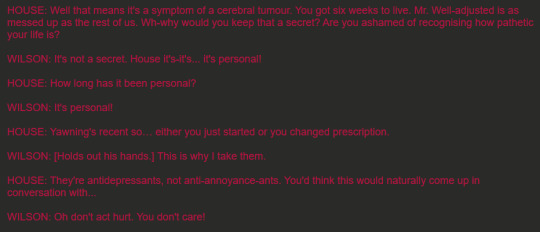
House, true to character when it comes to all things Wilson, assumes the worst. We don't know what Wilson is actually going through, that's left to be guessed at by the audience, but we do know that House has been effectively shut out while continuing to be concerned.
And then, only a few episodes later, we get two different patients: a man who experienced cardiac arrest and replicates it in front of House for the thrill, and a physically disabled man who discusses being free of his mortal body. We see House and Wilson have exchanges about both of these patients. First, about the knife in the outlet patient:


House repeatedly tries to draw Wilson back to the topic of suicidality, why? how? what was the plan? and Wilson repeatedly avoids the topic until he gives up and leaves the scene sooner than have the conversation. My read: The implication is that Wilson at some point in the past (whether or not this is recent past or long past, we don't know) dealt intimately with suicidal ideation that makes him uncomfortable, either personally or with a family member (maybe his brother). House takes this as confirmation.
So then, this scene is followed up later in the episode, where Wilson and House together are with the disabled strongyloides patient, who is telling them he does not want cancer treatment. The patient says death will be a relief--in front of Wilson, House looks at him before he addresses the patient. It triggers a knee-jerk reaction, anger.

House recognizes he oversteps and leaves the patient, but the argument continues between him and Wilson in the hallway. It goes much deeper than trying to talk a terminally ill man into living a few months longer, because the argument isn't really about him; he's just a narrative vessel for this conversation between these two characters.



The most popular read for this exchange is that House is arguing for himself, that he thinks misery isn't a good enough reason to take his life and he is telling himself that death isn't a worthy escape (which is definitely a valid read of the scene). But given the recent context of Wilson's depression, his utter refusal to share anything with House and therefore the audience, his complete discomfort with the suggestion of suicidal ideation and all the big questions like why and how and what for... I don't think House's actions after this scene are for House.
We have this argument where Wilson is arguing in defense of a man who is passively suicidal. "You don't know death isn't better, you can't know, death could be better. There could be a solace after all of this, you don't know." If this conversation is framed in context of Wilson being depressed and having potentially been suicidal, he's not defending the patient--he's defending himself, for having had those thoughts. And House is arguing with him, against those thoughts. Wilson's conclusion is you can't go to the afterlife and see how much it sucks.
Of course House's conclusion is to go to the afterlife and see how much it sucks.
This is the song playing while House contemplates what he needs to do.

Starting over anew without a partner, not knowing how to make sense of things, becoming a new terrified person in lieu of someone who is supposed to be there--that's where his mind is. He goes to look at the electrical outlet patient, just staring in silence. What could be so good that it needs to be revisited? He must be wrong. (Note that at no point does House ever share with Wilson that the electrical outlet patient's claim that death was the best 97 seconds of his life--he asks Wilson why but never follows up with the answer.)
So House pages Amber and tries to try to kill himself, as convoluted as it sounds, so he can know the afterlife isn't good. So he can have proof. So he'll have evidence. He'll know it sucks, even worse than Detroit, they can't have this argument again.
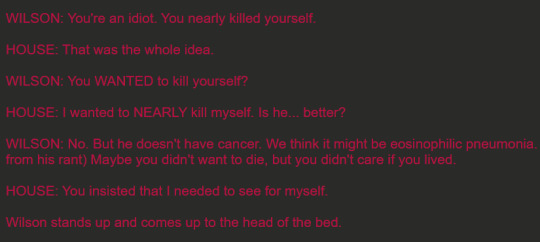
House says it explicitly. "You insisted that I needed to see for myself." He had to know.

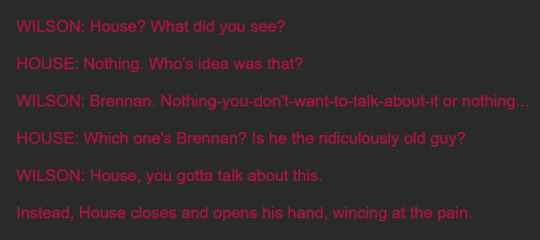

House wants to talk about what he experienced. He deliberately seeks out someone who will understand, asks for that person specifically, he wants to share. But with Wilson, he digs in his heels. Entrenched. We see that Wilson is generally the person House shares personal things with, such as the suspected identity of his biological father, he goes directly to Wilson after Dominika leaves in S8, he seeks him out throughout the Stacy arc in S2, pesters him while the fellows are fleeing in S3 even after the Tritter arc, his soft place to land during and after rehab in S6--Wilson is House's number one confidant.
Not on this subject. He refuses to say anything, except, "I love you." He doesn't respond to Wilson's criticism that he's already had near-death experiences before; he doesn't bite at any of the bait. Not talking about it. The person he wants to share with isn't there, so he doesn't share, not even with Wilson. The only thing we get as the audience is his dialogue to the corpse at the end of the episode.

This is also not something he shares with Wilson. Too much of a sensitive spot, too tender.
But all leading to my conclusion that... House didn't put the knife in the electrical socket for himself. As Wilson points out, House has had multiple near-death experiences. He doesn't need to almost die to find out what happens. He's already seen it. He already knows.
The character who has most recently displayed new depressive tendencies in this context isn't House. Wilson is the one refusing to discuss his mental health, ostensibly taking new psych drugs or minimally increasing the dosages, becoming uncomfortable with conversations about the difficult questions of suicide, and verbally defending a man's desire to die to end the mortal coil.
House didn't put the knife in the electrical socket to fight release for himself. He's been in chronic pain for a decade at this point, it hasn't changed, he has treated patients with self-destructive tendencies in the interim with no impact to his own mental health. This event didn't strike at a vulnerable time for House; it struck at a time when House knows Wilson is struggling, specifically when he has already tried to offer help and Wilson accused him of not caring. He had to do something.
House put the knife in the outlet to fight for Wilson. To have evidence, to talk him down. "See? I proved it. There's nothing. Now you know for sure. Now you have to stay with me."
That would be too saccharine. But he says, "I love you," and that's what he means.
#house md#hilson#house x wilson#meta#spencer speaks#this is obviously entirely my opinion and my own interpretation of the text#tw suicidal ideation
168 notes
·
View notes
Text
shin yoosung and lee gilyoung demonstrably would love kim dokja if he were a worm. they've proven it. they have a room full of evidence of how much they love every creature they think could possibly be kim dokja. when he disappears from the world they see him in all things and their love expands accordingly. so yeah, they'd love him if he were a worm. if he's a worm they immediately make him a super comfy terrarium and attach a label that says KIM DOKJA WORLD'S BEST WORM. the first few times they fight over who gets to cuddle him they maybe accidentally pull his head off, but they're quick learners. (and it grows back. the guy's a worm.)
now would they also find a way to make kim dokja being a worm into a competition over who loves him best? obviously. lee gilyoung would be all smug at first. he'd be like hyung is a bug, i win!! and shin yoosung would be all actually it means more that i love him because i clearly love ahjussi for ahjussi whereas you just love all bugs so it doesn't count. and then they'd slapfight until some nerd came along to reveal that worms are members of kingdom animalia, thereby destroying shin yoosung's argument. they have to settle it as a tie. a worm is clearly a bug and technically an animal. either way kim dokja is kim dokja and they would love him in any form, in every universe.
#idk is the whole returnee arc foreshadowing for the kdj fragments thing???#i can't articulate this because i'm just banging it out during a commercial break but are you seeing my vision or is#my vision nonsense? i need a second opinion lol#anyway i am right about the worm thing though. would they love him if he was a worm? no question. zero.#they wouldn't even understand the thought experiment. they'd be like obviously? duh??#orv#sys#lgy#orv spoilers#my posts#omniscient reader's viewpoint#f
131 notes
·
View notes
Text
Small changes I would have made to Doctor Who’s 60th Anniversary episode
For the most part, I really like The Star Beast. However, here are a few things I would have done differently.
Firstly, I think they should have made it clear that Rose Noble is nonbinary before the Meta-Crisis was reactivated. A trans woman is no more nonbinary than a cis woman. They make it very clear she’s trans but not that she’s nonbinary. Can a person be nonbinary while using exclusively she/her pronouns? Absolutely! However, they don’t make it clear that’s what they are doing.
The easiest way would have been to have Rose use she/they pronouns. I would have had Rose wear a badge with ‘she/them’ on it. I would also have added and tweaked a few lines when Donna and Sylvia were talking about Rose in the kitchen.
Sylvia: I don’t know. When I say she looks gorgeous, is that right? I mean, is it sexist? Or is it even the right word for someone who’s nonbinary? I never said it to him when he was… Oh… oh sorry.
Donna: Does she look gorgeous? Yes! So, stop worrying.
Sylvia: I just get so clumsy.
Donna: I know. So do I. You know Rose uses they/them pronouns too. You could use those if it’s easier.
The other thing I would change is the stupid line about a male presenting Doctor not ever thinking of letting something go. I hate that line. Not only is it sexist, it’s also said to the Doctor who – in one episode – has already been more emotionally open than any of the ones who came before including the one who was a woman.
Instead, it would have gone something like,
Doctor: We’ve still got to fix you two because the Meta-Crisis might have slowed down but that thing is wrapped around your cortex.
Donna: Yes, we know.
Rose: We know everything. Thanks.
Donna: And you apparently know nothing, even though you really should.
Rose: We’ve got all that power but there is a way to get rid of it.
Donna: It isn’t even a part of us, not really.
Rose: If a part of who you are isn’t really you or it’s hurting you, you can let it go and change.
Donna: How many times have you changed Doctor and this didn’t even occur to you! Anyway, like my wonderful daughter taught me we can let parts of ourself go and so we choose to let it go.
Then afterwards, there would have been a conversation about how Donna couldn’t have done that the first time around. It was happening to quickly; she didn’t know it was an option and she didn’t think she was worth anything without it. Now she knows better.
Then they’d talks some more about why the Doctor has his ‘old face back’. Is it because he isn’t able to change and move forward at the moment or is there another reason?
#doctor who#doctor who 60th anniversary#doctor who spoilers#spoliers#the star beast#14th doctor#rose noble#donna noble#sylvia noble#nonbinary#transgender#russell t davies#I am a cis woman so obviously my opinions on Rose Noble aren’t as important as the opinions of trans and nonbinary people#However I know being trans doesn’t automatically make someone nonbinary#And I’m not sure Russell T Davies knows that#That said people can be nonbinary any exclusively use she/her pronouns#But a line about Rose being nonbinary before would have been nice#I might also write a post about how I’d have re-written the episode#If it was my au where the 14th Doctor was a mix of everyone who came before
181 notes
·
View notes
Text
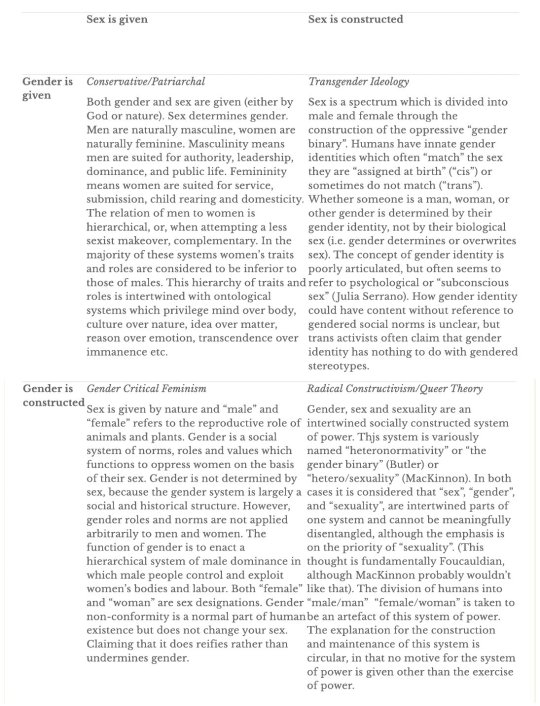
from here
#this has been living in my head the past few days because all you ever see in debates is 'there are 2 positions (trans v conservative)'#and sometimes you get '3 positions (rightwing v trans v 'some feminists)'#and its so interesting to think 'which positions are made invisible here and why'#when debates are like 'youre pro trans or you're a rightwing nazi' then its obviously a 'nice dichotomy whats outside it' situation#but even with 3 positions this has made me more conscious of the secret 4th thing#like how rfsl in their opinion statements are very queer constructionist#but in their practical activism they are trans ideological#and they flipflop between those two positions#and whenever u call them out on it they just go 'we dont care about philosophical wibble we just want trans ppl to live their lives!'#your organisations core opinions are incoherent with eachother and we're pointing it out#jane clare jones
255 notes
·
View notes
Text

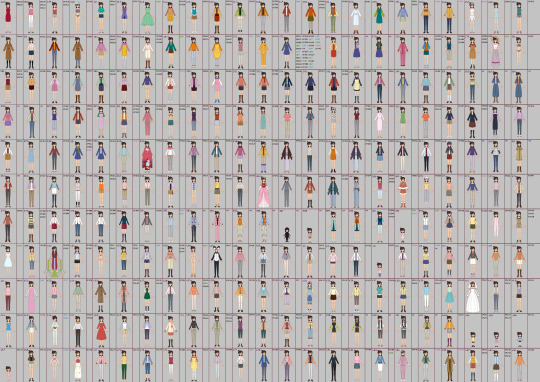
Episodes 1-500 Mouri Ran's Wardrobe!
+ Films 1-11 & OVAs 1-8
(better quality images under the cut)
Wow what an update! This took a while because uh she does not rewear her outfits very often in this segment of the show, still it was fascinating to see how the style of clothes changes over this time period. Also new to this update I went through and added the smol Ran's that have appeared that I skipped over before :)
This project has been a lot of fun and I intend to continue so they'll be more to come in the future too. In the meantime I want to know people's favourites! (Or least favourites are fun too) let me know in the comments/tags!
As a final P.S I've learnt that some of her merch/promo looks are unique and I was wondering if anyone knows if there's any archive or something of references of those cause some of those are really cute and I'd like to include them.
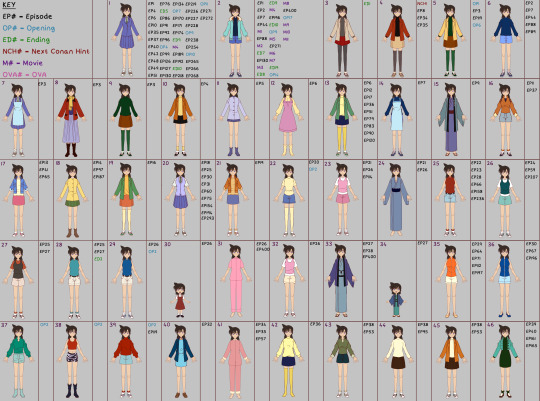
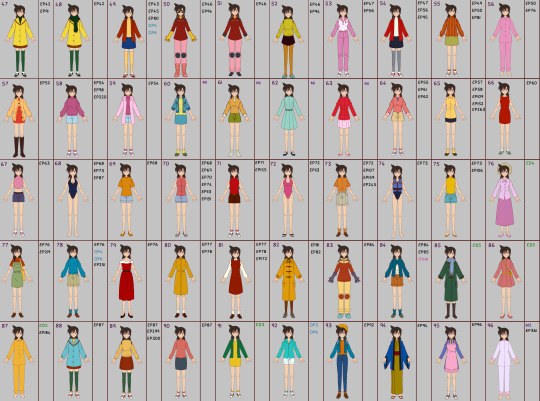
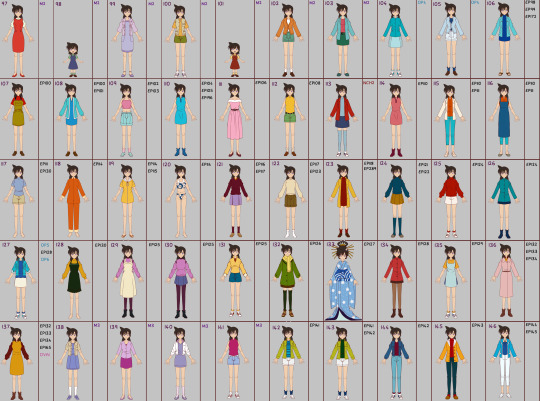
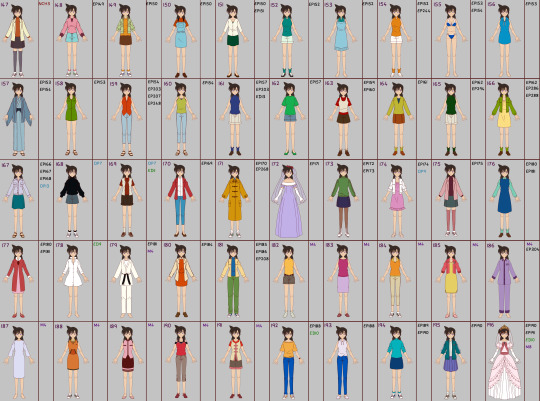
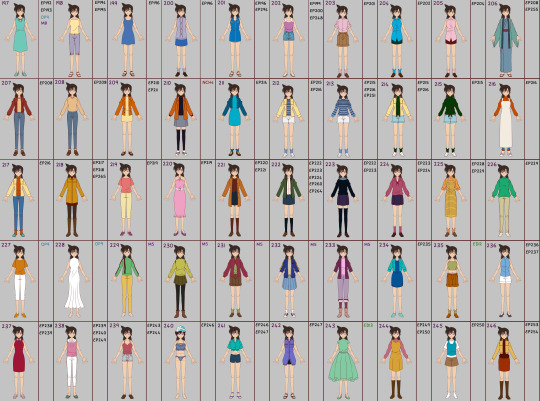
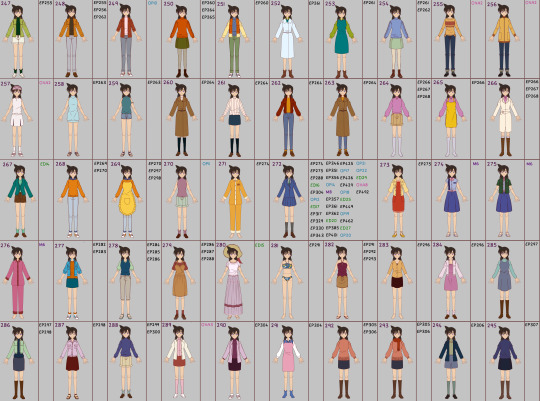
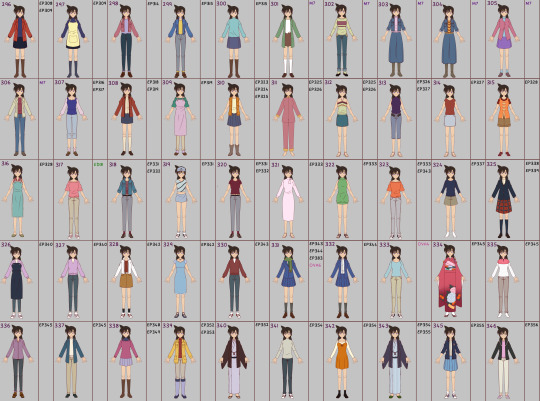
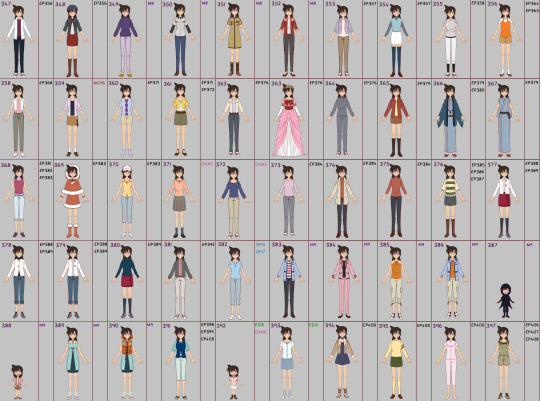
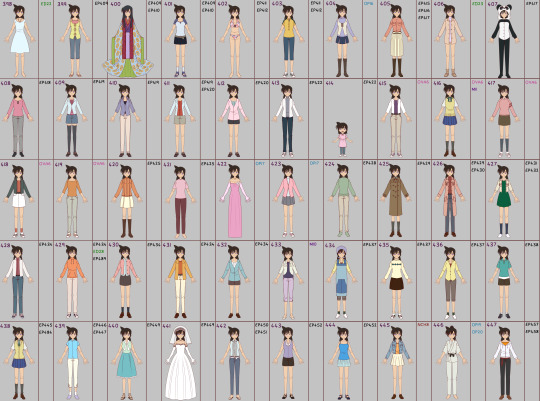
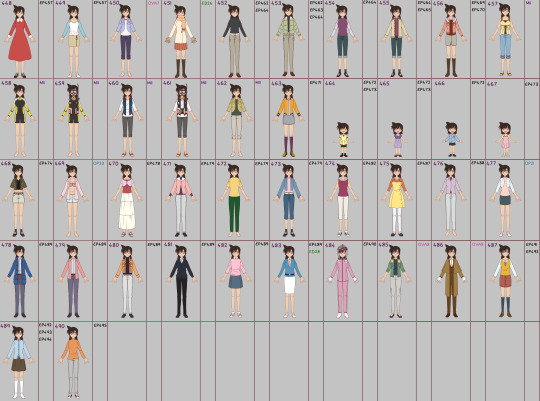
#dcmk#detective conan#mouri ran#detco#case closed#my art#ran#okay so maybe technically this could be called 1-495 or 1-504 because she doesn't appear for a while in that arc but uh 1-500 sounds neater#I gave each outfit it's own number to make referencing them easier but i worry I maybe now have too many numbers and it looks cluttered?#opinions on that too would be great pls#usual disclaimer regarding details/colours/shoes etc. where references where difficult and I took my best guess#personal favs include 484 skisuit absolutly adorable with those pompoms on the hat#also outfit 399 is super cute shame she only wears that for a short while#finally gotta mention the amazing 407 panda onesie obviously a winner#least favs include 475 why are those trousers under the dress???#463's jacket is great but the episode ends on a reveal of her shoes and socks and I was... surprised#442's collar is weird too
172 notes
·
View notes